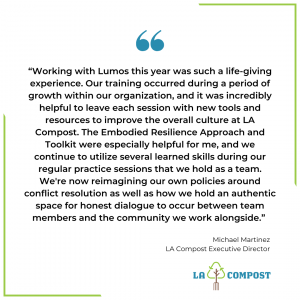
INDUSTRY: Environmental Protection / Sustainability
EMPLOYEES: 15 full time
THE CHALLENGE
About LA Compost
LA Compost is a community-based, nonprofit organization dedicated to establishing and promoting community composting. By using a model of decentralized community compost hubs, the organization’s impact is felt throughout the city of Los Angeles, strengthening and empowering communities by creating shared spaces for people to connect with each other and the natural environment. Compost hubs are intentionally established in locations where people congregate and coexist—churches, schools, gardens, and workplaces—and each reflects the community in which it’s located and mobilizes community members as stewards. LA Compost also collaborates with a wide array of partners, including community gardens, neighborhood councils, and city agencies.
As a new organization that experienced rapid substantial growth immediately before and during the first two years of the pandemic, LA Compost felt the need to stabilize and strengthen their organizational culture, especially in light of the tensions inherent in a diverse team of employees and partners spread across a large geography.
THE SOLUTION
Holistic Embodied Trauma-Informed Resilience-Oriented Capacity Building for Staff
LA Compost partnered with Lumos Transforms for a 6-month holistic embodied trauma-informed resilience-oriented (eTIRO) program. LA Compost sought to increase its workforce’s capacity and resilience by acquiring the knowledge and skills needed to improve trust, empathic communication, cultural responsiveness, and establish just pathways to conflict resolution. Lumos developed a customized training series to fortify LA Compost’s organizational culture by resourcing staff with the knowledge and skills needed for consistent, value-aligned communication and conflict resolution.
Building on Lumos’ signature program, The Resilience Toolkit, the training series centered on cultivating skills needed for a long-term, sustainable healthy workplace culture – embodied self-awareness, nervous system and emotional regulation, and empathic interpersonal connection. Practice groups provided opportunities to deeply integrate embodied resilience knowledge and skills, supporting robust individual and team learning and growth.
Lumos scaffolded The Resilience Toolkit with specific eTIRO training focused on compassionate communication and harm repair, both foundational to sustaining a healthy workplace culture and the sustained staff engagement on which generative conflict resolution rests.
THE RESULTS
Staff Self-Awareness, Compassionate Communication, and Connection
The sessions provided an opportunity for colleagues to learn more about and connect with their peers, a rarity given that much of LA Compost’s work is geographically dispersed across the city. The program trained LA Compost staff in applying humane values that not only prevent trauma, but also foster a compassionate culture of equity and justice. Participants reported significant improvements in self-awareness, compassionate communication, and connection to their colleagues. They are now able to identify their stress responses in real time, and use an embodied approach that considers how stress manifests for them physically, mentally, emotionally, and socially to determine whether or not those responses are appropriate.
Participants also reported using Resilience Toolkit practices to regulate their stress responses, allowing them to feel more fully present and engaged at work. These skills helped participants to identify and attune to stress and trauma responses in others, which disrupts reactivity and generates empathic connection.
Finally, participants developed an understanding of their shame responses and the role of shame resilience in harm repair, laying the groundwork for successful conflict resolution. Increased awareness, along with developing non-judgemental listening skills, extended to their colleagues and the communities they work with.
LA Compost continues to practice together in regularly scheduled, peer-led practice groups, further integrating this work into the organization’s culture.
